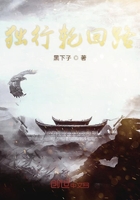Just to complete this impression let me repeat a pleasant story about this king and our Prince of Wales, who recently visited the Italian front.The Prince is a source of anxiety on these visits; he has a very strong and very creditable desire to share the ordinary risks of war.He is keenly interested, and unobtrusively bent upon getting as near the fighting as line as possible.But the King of Italy was firm upon keeping him out of anything more than the most incidental danger."We don't want any historical incidents here," he said.I think that might well become an historical phrase.For the life of the Effigy is a series of historical incidents.
6
Manifestly one might continue to multiply portraits of fine people working upon this great task of breaking and ending the German aggression, the German legend, the German effigy, and the effigy business generally; the thesis being that the Allies have no effigy.One might fill a thick volume with pictures of men up the scale and down working loyally and devotedly upon the war, to make this point clear that the essential king and the essential loyalty of our side is the commonsense of mankind.
There comes into my head as a picture at the other extreme of this series, a memory of certain trenches I visited on my last day in France.They were trenches on an offensive front; they were not those architectural triumphs, those homes from home, that grow to perfection upon the less active sections of the great line.They had been first made by men who had run rapidly forward with spade and rifle, stooping as they ran, who had dropped into the craters of big shells, who had organised these chiefly at night and dug the steep ditches sideways to join up into continuous trenches.Now they were pushing forward saps into No Man's Land, linking them across, and so continually creeping nearer to the enemy and a practicable jumping-off place for an attack.(It has been made since; the village at which Ipeeped was in our hands a week later.) These trenches were dug into a sort of yellowish sandy clay; the dug-outs were mere holes in the earth that fell in upon the clumsy; hardly any timber had been got up the line; a storm might flood them at any time a couple of feet deep and begin to wash the sides.Overnight they had been "strafed" and there had been a number of casualties;there were smashed rifles about and a smashed-up machine gun emplacement, and the men were dog-tired and many of them sleeping like logs, half buried in -clay.Some slept on the firing steps.
As one went along one became aware ever and again of two or three pairs of clay-yellow feet sticking out of a clay hole, and peering down one saw the shapes of men like rudely modelled earthen images of soldiers, motionless in the cave.
I came round the corner upon a youngster with an intelligent face and steady eyes sitting up on the firing step, awake and thinking.We looked at one another.There are moments when mind leaps to mind.It is natural for the man in the trenches suddenly confronted by so rare a beast as a middle-aged civilian with an enquiring expression, to feel oneself something of a spectacle and something generalised.It is natural for the civilian to look rather in the vein of saying, "Well, how do you take it?" As I pushed past him we nodded slightly with an effect of mutual understanding.And we said with our nods just exactly what General Joffre had said with his horizontal gestures of the hand and what the King of Italy conveyed by his friendly manner;we said to each other that here was the trouble those Germans had brought upon us and here was the task that had to be done.
Our guide to these trenches was a short, stocky young man, a cob;with a rifle and a tight belt and projecting skirts and a helmet, a queer little figure that, had you seen it in a picture a year or so before the war, you would most certainly have pronounced Chinese.He belonged to a Northumbrian battalion; it does not matter exactly which.As we returned from this front line, trudging along the winding path through the barbed wire tangles before the smashed and captured German trench that had been taken a fortnight before, I fell behind my guardian captain and had a brief conversation wit this individual.He was a lad in the early twenties, weather-bit and with bloodshot eyes.He was, he told me, a miner.I asked my stock question in such cases, whether he would go back to the old work after the war.He said he would, and then added--with the events of overnight on his mind: "If A'hm looky."Followed a little silence.Then I tried my second stock remark for such cases.One does not talk to soldiers at the front in this war of Glory or the "Empire on which the sun never sets" or "the meteor flag of England" or of King and Country or any of those fine old headline things.On the desolate path that winds about amidst the shell craters and the fragments and the red-rusted wire, with the silken shiver of passing shells in the air and the blue of the lower sky continually breaking out into eddying white puffs, it is wonderful how tawdry such panoplies of the effigy appear.We knew that we and our allies are upon a greater, graver, more fundamental business than that sort of thing now.We are very near the waking point.
"Well," I said, "it's got to be done."
"Aye," he said, easing the strap of his rifle a little; "it's got to be done."THE WAR IN ITALY (AUGUST, 1916)















